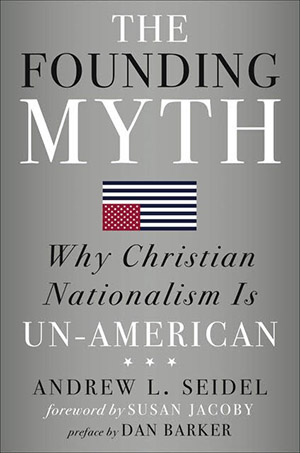Politicians, Take Note: Secular Voters Are a Powerful, and Growing, Part of the Population
The shift among voters likely means a corresponding shift in what makes a candidate electable.
![[Photo: A woman in scrubs walks past a line of voting booths]](https://rewirenewsgroup.com/wp-content/uploads/2018/11/scrubsvotingbooth-800x533.jpg)
Given the intensity of the news cycle last week, you might have missed the biggest story of the election: the surge of the “nones.”
U.S. voters hit two important milestones in the 2018 midterm. First, Protestants were not the majority of the electorate, according to Religion News Service. Second, as white evangelical Christians, who carried Trump into office on a wave of Christian nationalism, are barely maintaining their share in the electorate, nonreligious people are gaining. “Nones”—those who self-identify as nonreligious on surveys like those conducted by the Pew Research Center—sharply increased their share of the U.S. electorate, from 11 percent in 2006 to 17 percent in 2018. That’s a massive, 55 percent increase.
A second, similar metric shows the same growth: The number of people in the United States who enter the voting booth but not church is also surging, from 18 percent in 2014 to 27 percent in 2018. That’s another big jump of 50 percent. Nones are also younger and the fastest-growing religious identification. That means as evangelicals age out, nones replace them in age groups that are more likely to vote.
In other words, the electorate’s trend away from religion is going to continue and probably accelerate. The shift in the electorate likely means a coming shift in those being elected and in what makes a candidate electable.
The signs are already visible. This year, three U.S. representatives formed the first ever Congressional Freethought Caucus, which is dedicated to four goals, including promoting “public policy formed on the basis of reason, science, and moral values;” and “protect[ing] the secular character of our government by adhering to the strict Constitutional principle of the separation of church and state.”
The caucus quickly grew to ten members, all of whom won their re-election. Rep. Jared Huffman (D-CA) was the principal founder of the Congressional Freethought Caucus. Before announcing the caucus and against the advice of friends and family, he courageously came out as nonreligious. Conventional wisdom and several past studies on voting for hypothetical atheist candidates held that doing so would hurt his re-election chances, even in California. But Election Day proved otherwise, with Huffman winning by nearly 50 points. His lack of religion didn’t dent his share of the vote. (Laws on the books in eight states bar atheists from holding public office, though such laws are unenforceable.)
Voters elected more freethinkers—an umbrella term for everyone who rejects religion, be they atheist, agnostic, skeptic, humanist, or simply nonreligious—this year than in any other election. The Freethought Equality Fund, a PAC dedicated to increasing the number of office holders who are openly religiously unaffiliated, announced that 47 openly nontheists or humanists won elections at the federal and state levels, nearly triple the number currently in office. There are seven new members of the House of Representatives who are religiously unaffiliated: Katie Hill (CA), Sean Casten (IL), Sharice Davids (KS), Tom Malinowski (NJ), Antonio Delgado (NY), Chrissy Houlahan (PA), and Jennifer Wexton (VA). Kyrsten Sinema, Arizona’s new senator, also “ascribes to no religion,” as the New York Times reported.
As this trend continues, religious pandering will be less of a political necessity and it may even become a liability, and we will see its decline. This coming shift will have important policy ramifications, though there will a lag time before we see them. The attempt to redefine religious freedom will be stopped, in the legislatures if not the courts. The political power of the Catholic Church will be checked to an extent, though its money will always buy it influence. In general, the halting and even rollback of Christian privilege might begin.
There are many principled reasons to stand against religious pandering, but politicians do it because it is fruitful. But the more secular “We the People” (and especially we the voters) become, the less politicians will cater to religious sensibilities. Eventually, we’ll hit a tipping point where the pandering is not simply worthless, but actually harmful.
It’s time for politicians to take note: Secular people are a powerful and growing voting bloc. Pander to the evangelicals and you ignore, malign, or offend secular values voters. Politicians who do so may soon find that they are not rewarded with higher office, but relegated to obscurity.


